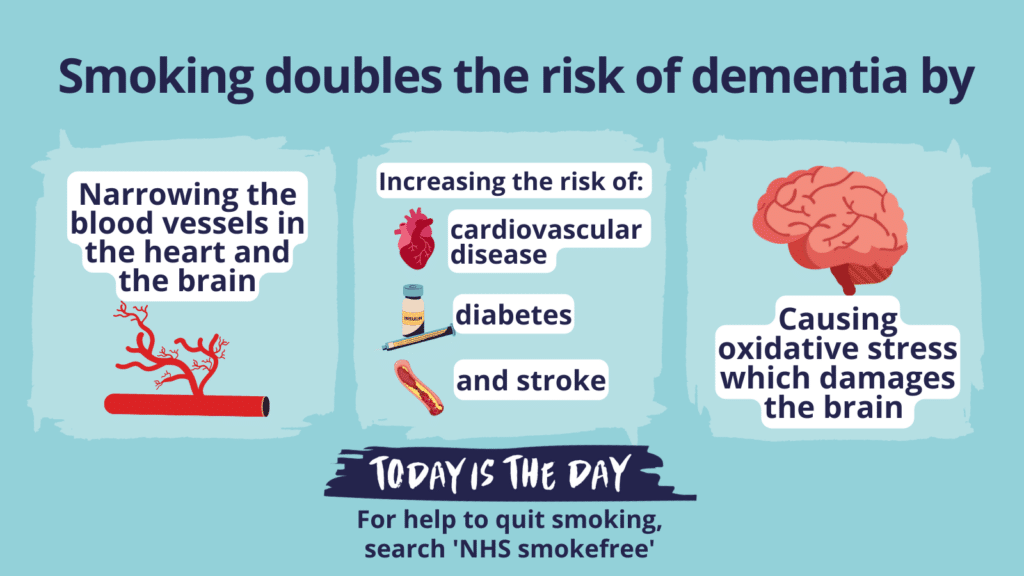The 8th March 2023 is National No Smoking Day. Organisations including the NHS and leading cancer charities are using the day to promote the benefits of giving up smoking. The graphic below shows just some of the risks of smoking.

As well as protecting your brain, heart and lungs, stopping smoking has another benefit you may not have thought of – it can actually aid your ear health. Did you know that compared to non-smokers, smokers have a 70% greater chance of developing hearing loss. In addition to this, non-smokers are twice as likely to develop hearing loss if they live with a smoker. The greater your daily average of cigarettes, the greater your risk of developing hearing loss.
How can smoking cause hearing loss?
There are several areas in the body which smoking impacts that can have a direct impact on hearing loss. These include:
Eustachian tube
Your eustachian tube runs from your middle ear to the back of your throat. It equalises the pressure in your ears, and it drains the mucous created by the lining of your middle ear. Smoking leads to problems — and even blockages — in the eustachian tube, causing pressure build-up and hearing loss.
Blood Pressure
Smoking impacts your blood pressure. What does that have to do with your hearing? The structures in your inner ear depend on good, sturdy blood flow. When your blood pressure changes, your inner ear has difficulty processing sound. In pregnant women, smoking restricts blood flow — and, therefore, the oxygen supply — to the foetus. The developing inner ear doesn’t get enough oxygen, so it develops more slowly and could lead to speech-language problems later.
Neurotransmitters
Neurotransmitters are messengers that carry information between the cells in your body. Nicotine interferes with how your body regulates a key neurotransmitter — one that is crucial for transporting sound information from your inner ear to your brain. This means your brain isn’t getting enough sound input, so it has a harder time making sense of the sounds you hear.
Central nervous system
The parts of your central nervous system that create your ability to hear are still developing in late adolescence. This system is easily damaged by toxins — such as nicotine — during its development, which could explain the prevalence among adolescents of hearing loss due to second-hand smoke.
Smoking and Tinnitus
There is sufficient evidence that smoking is associated with tinnitus. The dangerous chemicals in cigarette smoke, which include formaldehyde, benzene, arsenic, vinyl chloride, ammonia, and hydrogen cyanide, affect not only your middle ear, but also your inner ear, by damaging the hair cells lining the cochlea. As a result of this damage, nicotine consumption can cause tinnitus, dizziness and vertigo.
Can Vaping affect my hearing?
Because vaping is relatively new, there hasn’t yet been many studies on the connection between vaping and tinnitus. So far, however, it appears that vaping carries similar risks to smoking, as it also contains nicotine – and depending on the chemicals that are used in the vape juice, it may even be more harmful.
Tips on giving up smoking:
If you are hoping to give up smoking this March, Thames Valley Cancer Advice have shared some handy tips to help you quit smoking for good.
- Pick a quit date and add it to your calendar
- List your reasons to quit
- Use stop smoking aids to help manage cravings
- Change your routine if you smoke at certain times of day
- Tell people you are quitting
- If you’ve tried to quit before, remember what worked
- Have a plan if you are tempted to smoke
- List your smoking triggers and how to avoid them
- Keep cravings at bay by keeping busy
- Exercise away the urge
If you are concerned about the impact of your lifestyle on your ear health, don’t hesitate to book a consultation with us today.









Recent Comments